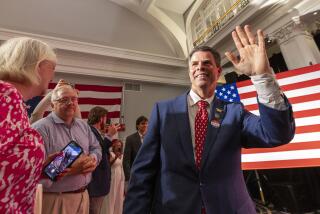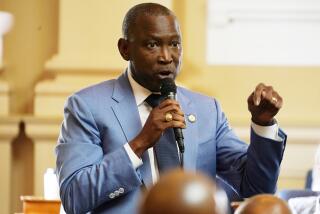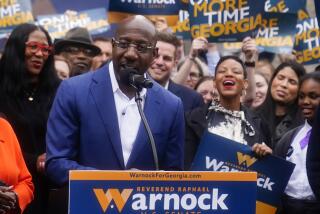Robb Wins Senate Renomination in Virginia Primary : Politics: The Democrat now faces Republican Oliver L. North and two independent candidates, including former Gov. Wilder.
- Share via
WASHINGTON — Sen. Charles S. Robb won renomination in the Virginia Democratic primary Tuesday, and plunged into a four-way contest for his seat that is already sending tremors across the national political landscape.
With 100% of the precincts reporting, Robb had 154,524 votes, or 58%; state Sen. Virgil H. Goode Jr. had 90,531, or 34%; Richmond lawyer Sylvia Clute had 17,096, or 6%, and Lyndon H. LaRouche Jr. follower Nancy Spannaus had 4,505, or 2%.
Goode conceded about 90 minutes after the polls closed and said he would support Robb in the Nov. 8 general election.
Robb faces challenges from an all-star cast: Iran-Contra figure Oliver L. North who is the Republican nominee and two independent candidates, former Republican state Atty. Gen. J. Marshall Coleman, and former Democratic Gov. L. Douglas Wilder.
Both independents filed petitions this week claiming a place on the ballot, although they put off formal announcements of their candidacies until later.
Irony and frustration abound for both parties in this competition. “Any untainted Democratic candidate could beat Ollie North,” said Mary Washington College political analyst Mark Rozell. “And any credible Republican candidate could beat Chuck Robb.”
Now most analysts seem to believe that any of the four could win. A poll released last week by Mason Dixon Opinion Research showed all the candidates closely bracketed. Robb led in the survey with 28%, followed by Coleman with 25%, Wilder with 22% and North with 21%.
“I wouldn’t bet a nickel on who the winner might be,” said University of Virginia political analyst Larry J. Sabato.
The Virginia Senate contest is one of a handful around the country whose outcome will determine whether the Democrats can continue to maintain their 56-44 control of the Senate, which is imperiled in November because of retirements, anti-incumbent feeling and President Clinton’s unpopularity in some sections of the country.
Moreover the campaign in the Old Dominion exposes and underlines troublesome schisms within both national parties at a time when they are still trying to deal with the citizen discontent demonstrated by Ross Perot’s nearly one-fifth of the vote in the 1992 presidential election. Indeed some Perot supporters in Virginia are planning to organize a new party to back Coleman’s candidacy.
*
“The parties are finding it difficult to nominate candidates that are not leaving them vulnerable to attacks on their flanks,” said Robert D. Holsworth, Virginia Commonwealth University political scientist. “This campaign in Virginia really shows the fracturing of the political party system and I don’t think this is the only time we’re going to see this.”
On the Democratic side, state party chairman Mark Warner argued that the division in his party is not so damaging because it is based on the bitter personal differences between Robb and Wilder, rather than on ideological grounds.
But as the nation’s first elected black governor, Wilder is expected to draw the lion’s share of the African American vote and thus could polarize the party along racial lines.
“Black leaders around the country have been trying to send a message to the Democratic Party that they better look seriously at their numbers,” said Keith Haller, head of Potomac Research, a regional polling firm. “Doug Wilder can certainly help them send that message if he takes 70% of the black vote away from Robb.”
Recent polls show Wilder doing just that and some believe the figure will climb to close to 90% in November.
Among the Republicans, Coleman’s campaign seems bound to pit party moderates against conservative Christians who provided much of the strength that helped North gain the nomination at the GOP state convention earlier this month.
“There is a major battle taking place around the country for the heart and soul of the Republican Party and that battle has become fully engaged here in Virginia,” Rozell said. “The far right here has taken over the party and moderates feel alienated.”
The tension between these two forces was demonstrated last week immediately after North’s nomination when Senate Minority Leader Bob Dole (R-Kan.) delayed endorsing North until after he had met with Coleman. Dole ultimately gave North his blessing.
But Virginia’s highest elected official, Sen. John W. Warner, is leading the charge against North, whom he considers unfit to serve in the Senate because of his Iran-Contra involvement, by rallying support for Coleman.
Compounding this divisiveness are allegations of philandering and dabbling in drugs against Robb and of lying to Congress against North. These charges, bound to be aired during the campaign, will call attention to issues of character, a potential liability for any number of politicians, including Clinton.
“This is definitely going to raise the character issue more than any other campaign in the country,” said Democratic consultant Joe Trippi, an adviser to the campaign of state Sen. Goode, Robb’s chief opponent in the primary. “And if you have Paula Jones chasing you around it’s not going to help you,” he added, referring to the former Arkansas employee whose civil rights law suit against the President is based on charges of sexual impropriety.
Analysts attributed much of the upheaval in Virginia to North’s presence in the campaign. “As an American folk hero for defying the Congress he epitomizes protest against the political system, particularly the disenchantment among the religious right,” said Tom Morris, president of Emery and Henry College.
Morris believes that for all their problems, the two regular party nominees have the opportunity to define the campaign. “A lot depends on the extent to which Robb and North can hold on to their respective party’s base,” he said.
“Robb and North are both damaged goods” said the University of Virginia’s Sabato. “There is a reasonable chance that voters are going to package them both as scandal-scarred and look at the two independent candidates, Wilder and Coleman, who don’t have the negatives the others have.”
That would mean the Senate campaign could boil down to a replay of the 1989 gubernatorial election, when Wilder barely edged out Coleman.
*
Back then, Democrats were riding high, particularly Robb. He had won election to the Senate the year before with more than 70% of the vote and was considered a contender for the 1992 Democratic presidential nomination.
One set of troubles started as a result of his differences with Wilder. Two Robb aides were accused of wiretapping Wilder’s phone calls and Robb was investigated by a grand jury. He was not indicted but then long-simmering stories about personal indiscretions surfaced and Robb was criticized for his lack of candor in responding to them.
In 1989 North was convicted by a federal jury of obstructing a congressional inquiry, although the conviction was ultimately set aside on technical grounds.
*
Times staff writer Jeff Leeds contributed to this story.
More to Read
Get the L.A. Times Politics newsletter
Deeply reported insights into legislation, politics and policy from Sacramento, Washington and beyond. In your inbox three times per week.
You may occasionally receive promotional content from the Los Angeles Times.










